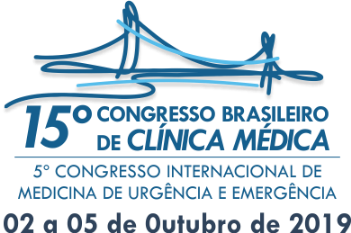Dados do Trabalho
Título
Effects of a 16-week Physical Training on Mortality, Quality of Life and Chronic Kidney Disease Progression: NEPHROS Post-Trial Follow-up
Fundamentação/Introdução
The NEPHROS is a randomized controlled trial which applied a 16-week aerobic and resistance training to patients with chronic kidney disease (CKD) and high blood pressure and found an improvement in functional capacity, inflammatory status and metabolic profile, compared with usual care.
Objetivos
The current report describes a long-term post-trial observational follow-up study, comparing survival, health-related quality of life (HRQoL) and estimated glomerular filtration rate (eGFR) change between the intervention and control groups, and according to in-trial cardiovascular (CV) risk factors.
Delineamento e Métodos
After three years of the original trial, the NEPHROS participants were revaluated. Cox proportional hazards was used to compare survival time and linear regression to compare the change in eGFR and physical and mental HRQoL summary scores, between intervention and control groups, and according to age, sex, and in-trial eGFR, hs-CRP, fasting plasma glucose, lipids, ankle-brachial index (ABI), functional capacity and blood pressure (BP).
Resultados
Of the 150 participants of NEPHROS, 128 individuals were included in the long-term analysis. There were 13 deaths, no patient needing renal replacement therapy, and none reported maintaining regular exercise. No effect of the previous exercise training on survival, eGFR or HRQoL change was observed. Baseline in-trial eGFR (HR 0.95; 95% CI 0.92 to 0.98) and ABI (HR 0.03; 95% CI 0.002 to 0.43) were positive independent predictors for survival. Lower ABI (coef. 9.00; 95% CI 0.43 to 17.5) and higher systolic blood pressure (coef. -0.13; 95% CI -0.24 to -0.03) were independent predictors for eGFR decline.
Conclusões/Considerações finais
We conclude that lower eGFR and ABI, and higher systolic BP were associated with poorer prognosis among CKD patients. A sixteen-week exercise program had no long-term effect on survival, quality of life or glomerular filtration change in patients with CKD stages 2 to 4. This finding highlights the scant usefulness of short-lasting structured exercise interventions if not associated with long-term lifestyle changes. Clinical Trial Registration (NEPHROS): Clinicaltrials.gov NCT01935297.
Palavras-chave
chronic kidney disease; nephros; mortality
Área
Clínica Médica
Instituições
Universidade Católica de Pelotas - Rio Grande do Sul - Brasil
Autores
Luciana Corrêa de Barros Cevenini, Priscila Dorothea Scalabrin, Maristela Bohlke, Franklin Corrêa Barcellos, Iná Silva Santos, Gregore Mielke
